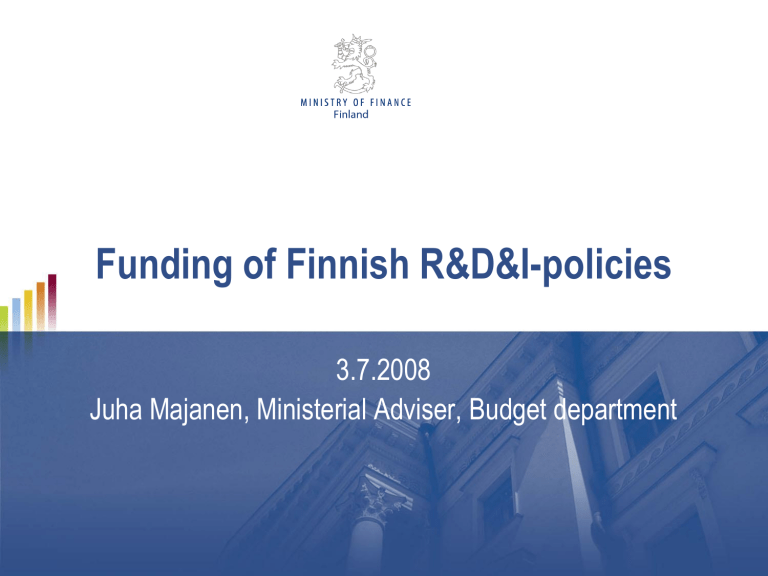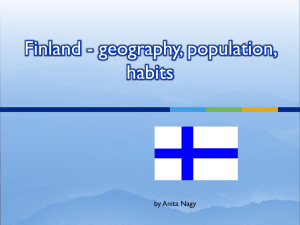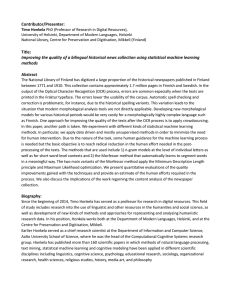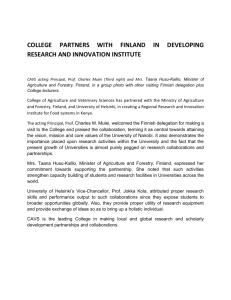Funding of Finnish R&D&I-policies 3.7.2008 Juha Majanen, Ministerial Adviser, Budget department
advertisement

Funding of Finnish R&D&I-policies 3.7.2008 Juha Majanen, Ministerial Adviser, Budget department R&D&I-expenditure, overview Total R&D&I-expenditure 2008 is estimated to amount about 6,3 billion euros of which: Private enterprises 4,26 billoin euros (71%) Public funding 1,80 billion euros (29%) Public R&D&I –expenditure is about 4,4 % of government spending in 2008 (exclusive interest payments on debt) Budget Department Budget Department 03/07/2008 03/07/2008 2 Central government budget expenditure by administrative branches in 2008, billion euros President, Parliament, Council of State 0.2 Foreign Affairs 1.1 0.7 Justice 1.1 Interior Defence 2.4 6.7 Finance 6.9 Education 2.8 Agriculture and Forestry 2.1 Transport and Communication 2.4 Labour and Industry 13.9 Social Affairs and Health Environment 0.3 Interest payments on debt 0,0 Source: MoF Budget Department Budget Department 2.4 5,0 10,0 15,0 May 14, 2008/VM/TaE 03/07/2008 03/07/2008 3 R&D&I-expenditure, overview Both private and public R&D&Iexpenditure have remained at relatively high level for years Growth of the R&D&I-funding has been about 4 to 5% each year However, due to very rapidly grown GDP, the GDP-ratio has decreased since 2005 Budget Department Budget Department 03/07/2008 03/07/2008 4 Private and Public R&D&I-expenditure, Finland 2000 - 2008 (2007 and 2008 are estimates, Billion euros) 5,00 3,70 % 3,48 % 3,45 % 3,43 % 3,45 % Billion euros 4,00 3,34 % 3,35 % 3,30 % 3,50 3,36 % 3,50 % 3,30 % 3,30 % 3,00 2,50 3,10 % 2,00 % of GDP 4,50 2,90 % 1,50 1,00 2,70 % 0,50 0,00 2,50 % 2000 2001 2002 Private sector Budget Department Budget Department 2003 2004 2005 2006 Public sector Source: Statistics Finland 2007 2008 Total, % of GDP 03/07/2008 03/07/2008 5 Public R&D&I -expenditure, Finland 2000 - 2008 (2007 and 2008 are estimates) 2,00 0,98 % 0,97 % 0,96 % 1,00 % 1,01 % 1,03 % 1,00 % 0,99 % 0,95 % 1,80 1,798 0,90 % 1,730 1,694 0,80 % 1,614 1,60 1,535 % of GDP Billion euros 1,00 % 0,70 % 1,453 1,40 1,389 1,352 0,60 % 1,296 1,20 0,50 % 2000 2001 2002 Budget Department Budget Department 2003 2004 2005 Source: Statistics Finland 2006 2007 2008 03/07/2008 03/07/2008 6 Main actors in R&D&I-funding Several actors are funding and executing R&D&I-programmes and -projects Tekes – Finnish Funding agency for Technology and Innovation Academy of Finland Sitra - the Finnish Innovation Fund Science and Technology Policy Council Ministry of Employment and the Economy Ministry of Education Universities Employment and Economic Development Centres (Regional TEcentres) Government research institutes Finnvera Oyj Industry Investment Other institutions Private enterprises Budget Department Budget Department 03/07/2008 03/07/2008 7 Main actors in public sector Parliament Science and Technolygy Policy Council Government Ministry of Education Ministry of Emloyment and the Economy Academy of Finland Tekes VTT Universities Technical Research Centre of Finland Other ministries and Research institutes Sitra Finnvera Oyj Finpro Industry Investment TE-centres Budget Department Budget Department DM 25736 01-2008 Copyright © Tekes 03/07/2008 03/07/2008 8 Overview of innovation environment Private R&D&I activities of Private enterprises 4 109 BusinessAngels noin 380** Private funding from abroad 409 VTT 217 (*) year 2005 (**) old estimate 2002 Public Year 2006, Million euros Academy of Finland 239 Universities 1 079* 82 Tekes 465 Sitra 29 Finnvera 406* Finpro 31 Foundation Ministries, for TE-centres Finnish Inventions 6 Research institutes 357 Basic research Applied research Budget Department Budget Department Investors: Private301 Industry Invesment: Development of companie Marketin Development Internationalization 03/07/2008 03/07/2008 9 DM 25736 02-2008 Copyright © Tekes Public R&D&I-funding, main actors (Budget 2008, MEUR) Other R&D&I Funding 241 Meur 13 % Tekes – Finnish Funding agency for Technology and Innovation 526 Meur 30 % Governm ent research institutes Basic R&D&I funding allocated in central government budget 282 Meur 16 % Tekes and Academy of Finland (Total 823 MEUR) offer funding on a competetive basis Academ y of Finland Universities 452 Meur 25 % Budget Department Budget Department 297 Meur 16 % Source: Statistics Finland 03/07/2008 03/07/2008 10 R&D&I expenditure, main actors (2006, MEUR) Universities 1 079 MEUR Public sector 574 MEUR Private enterprises 4 108 MEUR Budget Department Budget Department Source: Statistics Finland 03/07/2008 03/07/2008 11 R&D&I-expenditure and funding, main actors (2006, MEUR) Expenditure Funding Domestic Private Foreign Public Public Total enterprises Foundations funging Funding Funding Meur Meur Meur Meur Meur % 5 761 3 756 55 409 1 541 27 Year 2006 Total Private enterprises - Industry - Other branches Public sector - Central Government institutions - Other Public institutions - Non-profit organisations Higher education - Universities - University hospitals - Higschools Budget Department Budget Department 4 108 3 279 828 3 616 3 052 564 2 0 2 259 88 170 232 139 93 6 4 11 574 522 16 36 70 68 28 9 1 19 54 52 0 2 423 393 16 14 74 75 99 38 1 079 891 81 107 71 56 7 8 26 21 3 2 96 62 6 28 887 753 65 69 82 84 80 64 Source: Statistics Finland 03/07/2008 03/07/2008 12 Public R&D&I-allocation Disciplines (2006, MEUR) 300 277 261 250 231 228 205 200 Public sect. 150 Higher educ. 101 100 87 50 83 74 71 26 9 0 Natural science Technical science Budget Department Budget Department Medicine Agriculture and forestry Social science Source: Statistics Finland Humanities 03/07/2008 03/07/2008 13 Public R&D&I-allocation, Socio-political targets (2008, MEUR; %) Other sociopolitical targets (less than 50 MEUR) Defence 51; 3 % 175; 10 % Energy 88; 5 % Agriculture, fishery, forestry 94; 5 % Ehancing sciences 760; 43 % Health care 111; 6 % Enhancing industry 490; 28 % Budget Department Budget Department Source: Statistics Finland 03/07/2008 03/07/2008 14 Socio-political targets 2000 – 2008 (MEUR) 800 700 600 500 400 300 200 100 0 2000 Ehancing sciences 2001 2002 Enhancing industry Budget Department Budget Department 2003 2004 Health care 2005 2006 Agriculture, fishery, forestry Source: Statistics Finland 2007 Energy 2008 Defence 03/07/2008 03/07/2008 15 Top ten R&D&I-lines of industry (2006, MEUR) Man. of pulp, paper and paper products 86 Technical services 94 Wholesale and retail trade 84 R&D-services 186 Man. of basic metals and metal products 74 Man. of foodproducts and beverages 65 Man. of chemicals and chemical products 238 Manufacture of electrical equipments 2 320 Man. of machinery and equipments 317 ITC-services 365 Budget Department Budget Department Source: Statistics Finland 03/07/2008 03/07/2008 16 R&D&I-expenditure in private enterprises 2006, MEUR Total Expenditure Total Agriculture, fishing, hunting and Forestry Mining and quarrying Manufacturing Food products beverages and tobacco Textiles and textile products Wood and w ood products Pulp, paper and paper products Publishing and printing Oil, plastic and rubber Chemicals and chemical products Glass and Stone products Basic metals and metal Products Machinery and equipment Electrical equipments* Transport equipment Recycling Services Electricity, gas and w ater supply Construction Wholesale and retail trade Transport and storage Mail and communication ITC R&D-services Technical services Other services Other lines of industy Budget Department Budget Department 4 108 0 4 3 279 65 12 6 86 7 59 238 26 74 317 2 320 59 11 811 22 26 84 5 77 288 186 94 29 18 Salaries Services 2 054 0 1 1 589 35 6 3 44 4 29 120 12 26 143 1 121 26 5 455 4 16 29 2 38 199 93 56 17 8 Source: Statistics Finland 862 0 0 699 6 2 2 17 2 4 53 6 10 75 486 24 3 160 15 5 34 2 8 38 38 15 6 3 Machines, Other equipments Operational costs premises 249 944 0 0 2 0 200 791 8 15 2 3 0 1 5 19 0 2 19 8 17 48 1 7 2 7 16 83 127 585 1 8 1 2 47 150 0 3 2 3 1 20 0 1 8 23 14 38 17 38 5 18 1 5 0 2 03/07/2008 03/07/2008 17 Competitive funding programs Tekes and Academy of Finland Programmes, public funding about 550 Meur, 2008 Sitra programmes Researcher groups from both public sector (incl. universities) and private enterprises can compete and participate Budget Department Budget Department 03/07/2008 03/07/2008 18 Tekes’ programmes Ongoing Tekes programmes BioRefine 2007-2012 - New Biomass Products ClimBus - Business Opportunities in the Mitigation of Climate Change 2004-2008 Concepts of Operations 2007-2011 Digital Product Process 2008-2012 FinNano - Nanotechnology Programme 2005-2010 FinnWell - Future Healthcare 2004-2009 Fuel Cell 2007-2013 Functional Materials 2007-2013 GIGA - Converging Networks 2005-2010 Liito - Innovative Business Competence and Management 2006-2010 MASI - Modeling and Simulation 2005-2009 NORDITE 2005-2010 NewPro - Advanced Metals Technology - New Products 2004-2009 Pharma - Building Competitive Edge 2008-2011 Safety and security 2007-2013 Serve - Innovative Services 2006-2010 SISU 2010 - Innovative Manufacture 2005-2009 Sustainable community 2007-2012 SymBio - Industrial Biotechnology 2006-2011 Tourism and Leisure Services 2006-2009 Ubicom - Embedded ICT 2007-2013 VAMOS - Value Added Mobile Solutions 2005-2010 Verso - Vertical Software Solutions 2006-2010 Workplace Development Programme Tykes Budget Department Budget Department 03/07/2008 03/07/2008 19 Tekes’ evaluation criteria for applications High-quality, advanced technology and effective networking Project’s long-term effects, such as employment and potential turnover and exports The enterprise projects to be funded are selected by evaluating the business to be generated the technology, innovation and competence to be developed the resources available the cooperation to be developed and used the social and environmental well-being factors to be promoted the impact of Tekes funding and expert services The public research projects to be funded are selected by evaluating the technology and competence to be developed the cooperation to be developed and used the utilisation of results the resources available the social and environmental well-being factors to be promoted the impact of Tekes funding and expert services Budget Department Budget Department 03/07/2008 03/07/2008 20 Academy of Finland programmes Ongoing Finnish Academy programmes Environment and Law, ENVLAW (2005-2008) Information Technology in Mechanical and Automation Engineering, KITARA (2005-2009) Business Know-how, LIIKE2 (2006-2009) Neuroscience, NEURO (2006-2009) Nanoscience, FinNano (2006-2010) Sustainable Production and Products, KETJU (2006-2010) Nutrition, Food and Health, ELVIRA (2006-2010) Power in Finland, VALTA (2007-2010) Substance Abuse and Addictions, ADDIKTIO (2007-2010) The Future of Work and Well-being, WORK (2008-2011) Sustainable Energ, SusEn (2008-2011) Open for application Responding to Public Health Challenges (SALVE) Ubiquitous computing and diversity of communication (MOTIVE) Budget Department Budget Department 03/07/2008 03/07/2008 21 Academy of Finland’s evaluation criteria for applications Scientific quality and innovativeness of the research plan Competence of the applicant/research team Feasibility of the research plan Cooperation contacts for the research Significance of the research project for the promotion of professional careers in research and for researcher training Depending on the research project, the significance of the research project is also assessed in terms of society and business and industry. A starting point is that the project to be funded will benefit Finnish research, society or international cooperation. The Academy also pays attention to that research projects aiming at a high target level and new breakthroughs involve a risk of failure. The aim is to be fully aware of the risks involved and, nevertheless, to provide an opportunity for scientific breakthroughs as well as to increase the renewal of science and research. Budget Department Budget Department 03/07/2008 03/07/2008 22 Sitra’s Programmes Sitra currently focuses actively on five programmes: Health Care Programme Food and Nutrition Programme ERA Energy Programme Growth Programme for the Mechanical Industry Budget Department Budget Department 03/07/2008 03/07/2008 23 Strategic centres for science, technology and innovation I Strategic centres for science, technology and innovation are new instruments Coordinating research resources in Fields that are important to the future of Finnish society and business and industry. The aim is to create a new, more efficient framework for collaboration between companies, universities, research organisations and sources of funding. Companies, universities and research institutes will agree on a joint research plan. The plan will aim to meet the application needs for practical application by companies within a 5 to 10 year period. In addition to shareholders, public funding organisations will commit themselves to providing funding for the centres in the long term. Strategic centres for science, technology and innovation Budget Department Budget Department 03/07/2008 03/07/2008 24 Strategic centres for science, technology and innovation II Five strategic centres energy and the environment metal products and mechanical engineering the forest cluster health and well-being information and communication industry and services. Tekes did bear the main responsibility for organising the establishment of the centres. However, the actual establishment of the strategic centres has been the responsibility of the partners of the centre, i.e. companies, universities and research institutes. Budget Department Budget Department 03/07/2008 03/07/2008 25 Incentives for partnership Finnish innovation framework: A strong emphasis on long term cooperation and partnership between companies, researchers and funding organisations Transition towards demand- and end-userdriven innovation Renewal of innovation concepts Evaluation criteria of Tekes and Academy of Finland for applications Budget Department Budget Department 03/07/2008 03/07/2008 26 Example: Regional networking with partners from Oulu in electronics and telecommunications programmes Lappeenranta University of Technology (Lappeenranta) Salcomp Oy (Kemijärvi) CCC (Oulu) Sonera (Helsinki) Efore Oy (Helsinki) Nokia Mobile Phones (Oulu) National Semiconductor Finland Oy, former Fincitec Oy (Kemi) Cybelius Software Oy (Oulu) University of Oulu (Oulu) Tampere University of Technology (Tampere) Elektrobit Oy (Oulu) Projekti-Insinöörit Oy (Helsinki) Nokia Networks (Oulu) NetHawk Oy (Oulu) Teleste (Turku) ABB (Helsinki) ADC Telecommunications Oy (Oulu) JOT Automation Oy (Oulu) VTT, Technical Research Centre of Finland (Helsinki) VTT, Technical Research Centre of Finland (Oulu)Helsinki University of Technology (Espoo) Polar Electro Oy (Oulu) Nokia Research Center (Helsinki) Filtronic LK Oy (Oulu) Extrabit Oy (Oulu) Aspocomp Oy (Helsinki) Vaisala Oyj (Helsinki) Includes partners who participated in at least three projects in Tekes Electronics and Telecommunications technology programmes. Elcoteq Network Oyj (Lohja) Picopak (Lohja) Nokia Mobile Phones (Salo) Suunto Oy (Helsinki) Budget Department Budget Department Ultraprint Oy (Oulu) Planar Systems Oy (Helsinki) 03/07/2008 03/07/2008 27 DM 58620 03-2004 Copyright © Tekes Example: Regional networking with partners from Turku in electronics and telecommunications programmes Miratel Oy (Turku) Nokia Multimedia Terminals (Turku) Finnish Broadcasting Company (Helsinki) Elisa Communications (Helsinki) Sonera (Helsinki) University of Oulu (Oulu) Nokia Research Center (Helsinki) Helsinki University of Technology (Espoo) Tampere University of Technology (Tampere) VTT (Helsinki) Teleste (Turku) Satel Oy (Salo) Nokia Networks (Tampere) Nokia Mobile Phones (Tampere) ADC Telecommunications Oy (Oulu) Filtronic LK Oy (Oulu) Mariachi Oy (Turku) Includes partners who participated in at least three projects in Tekes Electronics and Telecommunications technology programmes. Budget Department Budget Department ABB (Helsinki) VTT (Oulu) Wallac Oy (Turku) 03/07/2008 03/07/2008 28 DM 58620 03-2004 Copyright © Tekes Regional Criteria and R&D&I Not used for funding offered on an competitive basis However R&D&I-activity seems to be important from the standpoint of regional development SMEs are encouraged to develop their capability to apply and utilize R&D&I funding (special funding for pre-R&D&I projects) decisions on allocation of funding are taken at the regional level Significant part of EU structural funds funding is used to R&D&I-purposes decisions at the regional level Universities have certain tasks in enhancing for example regional development Regional universities of applied sciences/Polytechnics decisions at the regional level Locating goverment research institutes or their functions Budget Department Budget Department 03/07/2008 03/07/2008 29 Network of universities, polytechnics, public research institutes and technology centres in Finland University Regional university unit Polytechnic Polytechnic regional unit VTT, Technical Research Centre of Finland or other public research institute Regional unit of public sector research institute Technology centre Budget Department Budget Department 03/07/2008 03/07/2008 30 DM 58620 03-2004 Copyright © Tekes Main financial incentives for the private sector Directly through: Grants Loans Investment/Venture capital (directly or through Venture Capital companies) No indirect tax incentives or expenditures Budget Department Budget Department 03/07/2008 03/07/2008 31 Example on incentives: Tekes’ funding Budget Department Budget Department 03/07/2008 03/07/2008 32 R&D&I-funding and fiscal ceilings Government spending limits are the ceiling Spending limits are ceiling for the Budget expenditures over the entire electoral period Includes about ¾ of budget expenditure, also R&D&Iexpenditure According to the current Spending limits the basic public R&D&I funding increases 80 MEUR during current electoral period (2007 – 2011) The 4 % GDP-ratio is expressed aim but no direct mechanical link to scaling of budget appropriations Budget Department Budget Department 03/07/2008 03/07/2008 33 Spending limits Budget Department Budget Department 03/07/2008 03/07/2008 34 Evaluation and budget process Strong emphasis on evaluating programmes and pojects, however: In the budget process evaluation results are usually referred only at the general level (and sometimes to legitimate proposals for additional funding) Examples of epressis verbis referred evaluations: Evaluation results of Centre of Expertise programme Evaluation of Finnish Innovation system relates to the ongoing preparation of Finnish Innovation Strategy Budget Department Budget Department 03/07/2008 03/07/2008 35 How R&D&I-policy targets are set As a part of performance budgeting As a part of performance management Performance management is an agreement-based interactive control model. Its operational core is in the ability of the agreement parties (ministry and agency) to find the appropriate balance between the available resources and the results to be attained with them. The basic idea of performance management is to balance resources and targets on the one hand and efficiency and quality on the other as well as possible and to ensure that the desired effects are cost-efficiently achieved. Achievement of targets are controlled and reported as a part of Accountability Budget Department Budget Department 03/07/2008 03/07/2008 36 Basic performance criteria (true and fair information) Outcome targets Policy effectiveness: outcomes Policy effectiveness How operations and finances have affected policy effectiveness Operational performance targets Operational efficiency Outputs and quality management -economy -goods and services - productivity - service capacity and quality - profitability Operational results: outputs (which can be influenced through management) - cost-equivalence Human resource management Budget Department Budget Department 03/07/2008 03/07/2008 37 Impacts of evaluation results Evaluation activities are an integral part of funding R&D&I-operation, however: evaluation results seem to be under-utilized evaluation results seldom result to reassesment of allocation of R&D&I-funding, specially at the level of ministries evaluation results are sometimes even unuseful due to the lack of quality of evaluation or for example due to unclear or incomplete performance targets Performance audit report 157/2008 of National Audit Office Budget Department Budget Department 03/07/2008 03/07/2008 38 Use of performance information in budgeting Different level of targets are set and examined: social policy targets: changes in the state of society and the conditions of its members and the extent to which the set targets have been achieved (social effectiveness); costs of achieving the social policy targets (cost effectiveness); operating performance outputs, service capacity and the quality of outputs and processes (outputs and quality management) economy, productivity and the cost effectiveness and profitability of charged and jointly financed operations (operational efficiency) personnel and job satisfaction, and information, expertise and renewal. Mainly at the level of Government and ministries Mainly at the level of agencies, e.g. Universities or institutes Above targets are set also for the R&D&I funding, however, there is no direct mechanical link between results achieved and allocation of funds Budget Department Budget Department 03/07/2008 03/07/2008 39 The effect chain of government agencies Policy effectiveness OUTCOMES OUTPUTS Goods an services, service capacity of the agency Operational PROCESSES and their quality RESOURCES Appropriations, staff, intangible assets Budget Department Budget Department 03/07/2008 03/07/2008 40 Preliminary conclusions, how to perform better Inputs are already at a relatively high level More emphasis on outcomes Significant amount of actors doesn’t necessarily mean significant results New challenges (e.g. ageing or energy and climate issues) demand adaptability from the management of R&D&I-funding Systemic approach More weight on utilizing evaluation information in decision making, specially at central government level Widening the innovation concept, more emphasis e.g. on services and social innovations Adjusting the innovation process to be more demandand customer-driven (“innovating together”) Budget Department Budget Department 03/07/2008 03/07/2008 41



